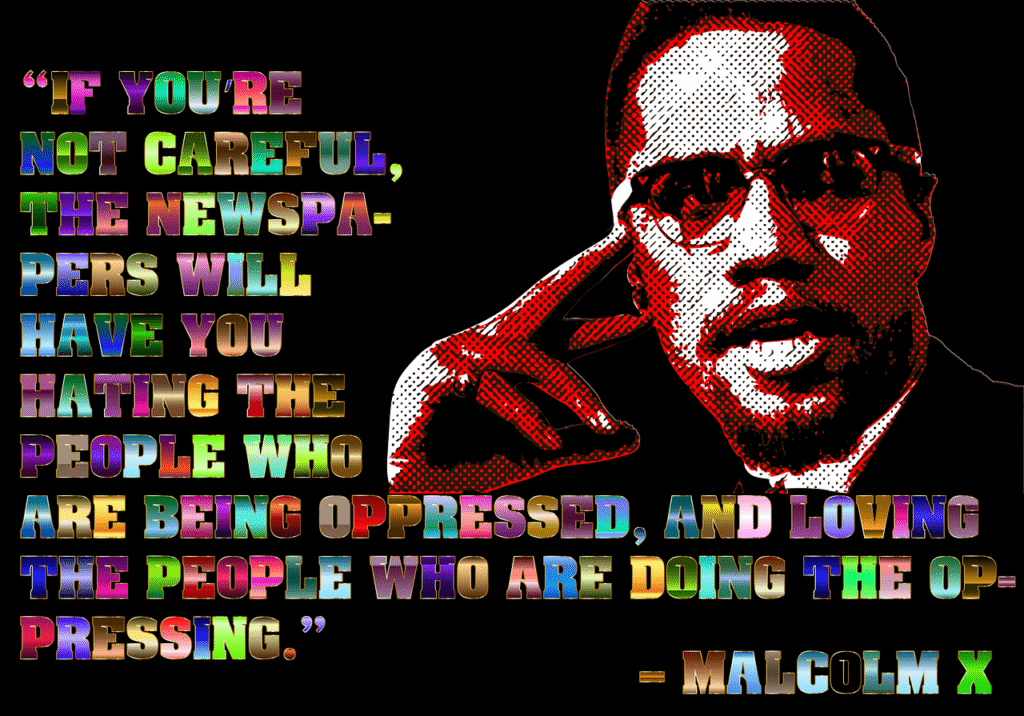Was Malcolm X merely the radical foil to Martin Luther King Jr., or was his political evolution a profound challenge to the very foundations of American liberalism? Dylan Aunger’s article, ““By Any Means Necessary”: Malcolm X, Black Nationalism, and the Radical Challenge to American Liberalism,” unpacks the complex ideological journey of one of the 20th century’s most misunderstood figures. Delve into this compelling analysis to discover how Malcolm X transitioned from Black nationalism to a global, anti-imperialist framework, offering an unflinching critique of America’s self-image and inspiring movements for justice that refuse to be deferred. If you seek to understand the enduring power of his call for liberation, this article is essential reading.

“By Any Means Necessary”: Malcolm X, Black Nationalism, and the Radical Challenge to American Liberalism
In the pantheon of twentieth-century African American leaders, Malcolm X occupies a unique and often controversial position. While Martin Luther King Jr. is widely celebrated as the apostle of nonviolence and racial integration, Malcolm X has been historically depicted as his radical foil—an advocate of Black nationalism, self-defense, and separatism. This characterization, while partially accurate, oversimplifies the complex ideological development Malcolm underwent throughout his life. Far from a monolithic figure, Malcolm X’s political thought evolved significantly, particularly after his departure from the Nation of Islam (NOI) in 1964. His radicalism presented a sustained critique of American liberalism, especially its failure to address the systemic, structural nature of racial oppression. This article explores Malcolm X’s political philosophy, particularly his transition from Black nationalism to a more global, anti-imperialist framework, and examines how his vision offered an unflinching challenge to the American state’s self-image as a liberal democracy.
Malcolm Little’s early life was marked by poverty, violence, and systemic racism. Born in Omaha, Nebraska in 1925, Malcolm experienced the brutalities of white supremacy firsthand. His father, Earl Little, a supporter of Marcus Garvey’s Universal Negro Improvement Association (UNIA), died under suspicious circumstances after a series of threats from white supremacists. His mother was later institutionalized, and Malcolm drifted into petty crime, eventually serving time in prison. It was during this incarceration that Malcolm encountered the teachings of Elijah Muhammad and the Nation of Islam—a religious and political movement that rejected integration, emphasized Black self-reliance, and denounced the moral decadence of white America.
The Nation of Islam’s theology drew on a blend of Islamic principles, Garveyite nationalism, and conspiratorial racial mythology. Elijah Muhammad taught that the white race was a deviant creation of a Black scientist, Yakub, and that African Americans were the original people of the Earth. While such teachings lacked historical or theological rigor, they offered a potent counter-narrative to a generation of African Americans disillusioned with both Christian integrationism and the broken promises of American democracy. Malcolm X, who adopted the “X” to signify the loss of his African heritage, quickly rose to prominence as the NOI’s most dynamic minister and spokesman.
Through his oratory and charisma, Malcolm transformed the NOI from a marginal sect into a national force. His speeches emphasized the need for Black people to reclaim their dignity and resist oppression “by any means necessary.” He derided civil rights leaders for their appeals to white conscience and accused them of perpetuating a false hope in integration. “You don’t get freedom peacefully,” he declared. “Anyone who is depriving you of freedom isn’t deserving of a peaceful approach.”[1] In doing so, Malcolm provided a radical critique not just of American racism but of liberal reformism itself.
At the heart of Malcolm X’s philosophy during his NOI years was a commitment to Black nationalism. He rejected both the integrationist dream and the myth of a color-blind democracy. In a nation where lynching, segregation, and economic exploitation defined Black life, Malcolm argued that African Americans were a colonized people within the borders of the United States. As such, they should pursue self-determination, economic independence, and the creation of separate Black institutions.
Malcolm’s nationalism was not merely cultural—it was deeply political. He drew attention to the failure of liberalism to deliver substantive equality, pointing out that legal victories such as Brown v. Board of Education had done little to dismantle the structures of white supremacy. Liberalism, in Malcolm’s view, was a form of ideological mystification that masked the enduring reality of racial violence and capitalist exploitation.[2] He derided white liberals for their paternalism and exposed the limitations of civil rights legislation that failed to address deeper economic inequalities.
Unlike the mainstream civil rights movement, which framed its demands within the context of the U.S. Constitution and Christian morality, Malcolm X sought to internationalize the Black freedom struggle. He argued that African Americans should frame their oppression not merely as a civil rights issue but as a human rights crisis. In one of his most important speeches, “The Ballot or the Bullet” (1964), he warned that unless America delivered justice, Black Americans might be forced to seek liberation “by the bullet.”[3] This was not a nihilistic embrace of violence, but a tactical endorsement of self-defense and an indictment of liberalism’s failures.
A pivotal moment in Malcolm X’s intellectual evolution came with his pilgrimage to Mecca in 1964. His experiences during the Hajj challenged his previous views on race and identity. Witnessing Muslims of all races praying together deeply affected him, prompting a rethinking of the rigid racial binary he had espoused within the NOI. Upon his return, he adopted Sunni Islam and changed his name to El-Hajj Malik El-Shabazz. More importantly, he distanced himself from the NOI’s racial doctrines and began to articulate a more expansive, global vision of liberation.
Malcolm’s establishment of the Organization of Afro-American Unity (OAAU) signaled his commitment to Pan-Africanism and international solidarity. Drawing on the ideas of Kwame Nkrumah and Frantz Fanon, Malcolm began to link the Black freedom struggle in the U.S. with anti-colonial movements in Africa and Asia. He argued that the conditions faced by African Americans were not unique but mirrored those of other oppressed peoples fighting imperialism.[4] This shift represented a crucial maturation in his thought—one that transcended the narrow confines of Black nationalism and embraced a revolutionary humanism rooted in anti-imperialism and anti-capitalism.
Malcolm’s post-Mecca speeches reflect this ideological transformation. In his address to the Oxford Union in 1964, he spoke of the global color line and called for solidarity among the oppressed of the world.[5] His politics had evolved into a dialectical synthesis of race, class, and global liberation, placing him in the tradition of revolutionary thinkers such as W.E.B. Du Bois and C.L.R. James. What remained constant, however, was his unrelenting critique of American hypocrisy and his insistence that true freedom required structural, not superficial, change.
Malcolm X was assassinated on February 21, 1965, at the Audubon Ballroom in Harlem. His death, which occurred shortly before the rise of the Black Power movement, robbed the world of a rapidly developing thinker whose vision was becoming increasingly nuanced and internationalist. In the decades since, Malcolm has been reclaimed by a wide array of political movements—from Black nationalists and Pan-Africanists to hip-hop artists and prison abolitionists. His speeches and writings continue to resonate, particularly in moments of crisis when the contradictions of American democracy are laid bare.
Contemporary scholars have emphasized the importance of viewing Malcolm not merely as a militant but as a theorist of liberation. Manning Marable’s magisterial biography, Malcolm X: A Life of Reinvention, underscores the fluidity of Malcolm’s thought and the ways in which his final years represented a move toward a more inclusive, global political vision.[6] Similarly, scholars such as Angela Davis and Robin D.G. Kelley have highlighted Malcolm’s relevance to contemporary struggles against mass incarceration, police violence, and racial capitalism.[7]
The enduring power of Malcolm X lies in his refusal to offer easy solutions. Unlike liberal reformers who sought accommodation within the existing system, Malcolm called for its fundamental transformation. He challenged Black Americans to reject the politics of respectability and to reclaim their agency in the face of systemic dehumanization. His insistence on self-determination, dignity, and international solidarity continues to inspire movements for racial and economic justice today.
Malcolm X remains one of the most radical and misunderstood figures in American history. His political journey—from a street hustler to a Black nationalist to a global human rights advocate—reflects a profound engagement with the realities of racial injustice and the limitations of liberal democracy. By situating the African American struggle within a broader global context, Malcolm challenged the United States to confront its own contradictions and hypocrisies. His call for liberation “by any means necessary” was not a slogan of violence, but a demand for justice that would not be deferred. As long as structural racism and imperialism endure, Malcolm X’s vision will remain not only relevant but essential.
References:
[1] Malcolm X, The Autobiography of Malcolm X, as told to Alex Haley (New York: Ballantine Books, 1992), p. 296
[2] Manning Marable, Malcolm X: A Life of Reinvention (New York: Viking, 2011), pp. 194–97
[3] Malcolm X, “The Ballot or the Bullet,” speech, April 3, 1964. In Malcolm X Speaks: Selected Speeches and Statements, ed. George Breitman (New York: Grove Press, 1965), p. 23
[4] Angela Y. Davis, Freedom Is a Constant Struggle: Ferguson, Palestine, and the Foundations of a Movement (Chicago: Haymarket Books, 2016), pp. 14–18
[5] Malcolm X, “Speech at the Oxford Union,” December 3, 1964, in Malcolm X Speaks, p. 93
[6] Marable, Malcolm X: A Life of Reinvention, pp. 388–403
[7] Robin D.G. Kelley, Freedom Dreams: The Black Radical Imagination (Boston: Beacon Press, 2002), pp. 47–56
Author:

